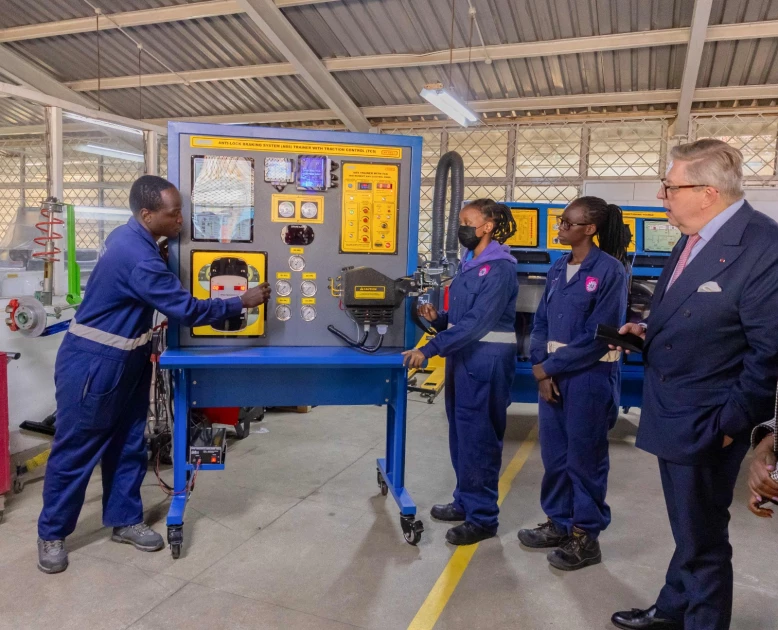Bridging skills gap through dual training in Kenya

Finland’s Ambassador to Kenya, Amb. Pirrka Tapiola (right), interacts with Automotive Mechatronics Trainees when he recently visited Nairobi Technical Training Institute (NTTI), one of the TVET institutions currently implementing Dual Training in Kenya.

Audio By Vocalize
The 2024 theme, "Youth Skills for Peace and Development," highlights the pivotal role young people play in peacebuilding and conflict resolution.
As economies evolve and new industries emerge, the demand for skilled workers grows. However, many young people lack the necessary skills to meet these demands, leading to high levels of youth unemployment.
Kenya is witnessing a transformation in its education system with a growing adoption of dual training as a competency-based model of equipping youth with skills for employability.
The dual training system integrates theoretical instruction at Technical and Vocational Education and Training (TVET) institutions with practical, hands-on training in industries. This approach ensures that students acquire both, theoretical knowledge and relevant work experience, making them job-ready upon graduation.
Finland and Germany have long been champions of vocational education and training, recognizing it as a cornerstone for inclusive economic development and social stability. Both countries have developed robust vocational training systems that effectively bridge the gap between education and employment.
The cooperation of Finland and Germany with Kenya has been pivotal in institutionalizing and scaling up dual training in Kenya.
Through the 'Promotion of Youth Employment and Vocational Training' programme, the governments of Finland and Germany have jointly supported Kenya in policy reforms, capacity building for trainers and management staff, and fostering greater collaboration between TVET institutions and the private sector.
This has created a sustainable framework where businesses and educational institutions work closely to develop curricula and provide training that meets industry standards and labour market requirements.
Additionally, this partnership has laid the groundwork for collaborative efforts to tackle the country's youth unemployment challenge.
One of the key successes of this collaboration is the implementation of dual training in 65 national TVET institutions across Kenya, in partnership with over 1,000 companies. The programme places a strong emphasis on gender equality and inclusion by actively encouraging the participation of women and persons with disabilities. Additionally, it addresses pressing issues in the fields of green jobs and digitalization, preparing students to meet the demands of a rapidly evolving economy. By 2026, the programme aims at educating at least 6,000 youth with employability skills.
On this World Youth Skills Day, we applaud all TVET stakeholders in Kenya for their invaluable contributions and urge them to sustain their commitment to youth skills training.
We commend companies for their active participation in dual training programs and encourage them to sustain partnerships with TVET Institutions.
On their part, educational institutions should continue aligning their training with industry needs through industry partnerships, monitoring student progress, providing certification, and ensuring vocational education's quality and relevance.
We strongly believe that through these collaborations, training institutions can create strong partnerships with industry, and produce diversely talented and highly motivated graduates ‘made in Kenya’ whose skills are tailored to the industry needs.
Looking ahead, we recommend that the Kenyan government should further implement regulations that incorporate hands-on skills training into curricula and establish frameworks and incentives that encourage greater industry participation in these programs. Offering incentives for companies that provide on-the-job training can offset training costs and encourage businesses to invest in developing a skilled workforce tailored to the needs of the labour market.
We call on youth to seize the opportunities presented through these collaborations. By engaging with TVET training programs and industry initiatives, young people can gain the skills needed to find decent employment and to drive positive change.
Finland and Germany remain dedicated to collaborating with the government of Kenya to enhance vocational training that bridges the skills gaps, addresses industry needs and tackles the challenge of youth unemployment.
Ambassador Pirkka Tapiola, Embassy of Finland and Alexander Fierley, Chargé d’Affairs a.i., Embassy of the Federal Republic of Germany.


Leave a Comment